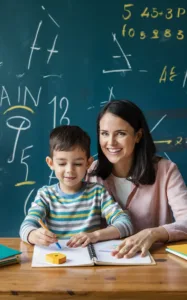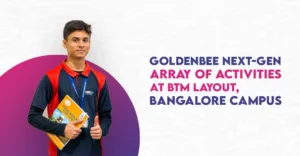Teaching math to young children can be a delightful and rewarding experience. Whether you’re a teacher or a parent, helping children grasp basic math concepts lays a strong foundation for their future learning. Here’s a guide to making math both fun and effective for young learners.
1. Use Everyday Situations
Math is all around us. Use everyday situations to introduce math concepts naturally. For instance, while cooking, you can teach measurements and counting. When shopping, you can discuss prices, quantities, and simple addition or subtraction.
Tips:
- Count objects around the house or classroom.
- Compare sizes, lengths, and weights.
- Discuss shapes and patterns found in daily life.
2. Incorporate Play and Games
Children learn best through play. Incorporating math games and activities makes learning fun and engaging.
Ideas:
- Board Games: Games like “Chutes and Ladders” or “Snakes and Ladders” can teach counting and number recognition.
- Puzzles: Shape and number puzzles help with spatial awareness and problem-solving.
- Building Blocks: Use blocks to teach patterns, counting, and basic geometry.
3. Use Visual Aids and Manipulatives
Visual aids and hands-on materials help children understand abstract concepts.
Suggestions:
- Counting Bears or Beads: Use these for counting, sorting, and pattern-making.
- Flashcards: Great for number recognition and basic operations.
- Charts and Graphs: Simple bar graphs or pie charts can introduce data representation.
4. Read Math Stories
There are numerous children’s books that incorporate math concepts. These stories make math relatable and enjoyable.
Recommended Books:
- “Anno’s Counting Book” by Mitsumasa Anno : Counting.
- “Quack and Count” by Keith Baker : Adding & Subtrating.
- “One Fish Two Fish Red Fish Blue Fish” by Dr. Seuss : Great for learning numbers and colors.
- “The Growing Story” by Ruth Krauss : Measurement & Size.
5. Sing Songs and Rhymes
Songs and rhymes are effective tools for teaching math concepts like counting, patterns, and sequences.
Popular Math Songs:
- “Five Little Ducks”
- “Ten in the Bed”
- “One, Two, Buckle My Shoe”
6. Practice, Practice, Practice
Regular practice is key to mastering math concepts. Short, daily sessions are more effective than long, infrequent ones.
Tips:
- Incorporate math into your daily routine.
- Use worksheets and online resources for additional practice.
- Encourage children to explain their thought process.
7. Encourage a Positive Attitude Towards Math
Children often develop a fear of math early on. It’s crucial to foster a positive attitude.
Ways to Encourage:
- Praise efforts, not just correct answers.
- Show enthusiasm and excitement about math.
- Provide a supportive and patient environment.
8. Introduce Technology
Educational apps and online games can be valuable tools for teaching math concepts.
Recommended Apps:
- Khan Academy Kids
- Byju’s
- Prodigy Math: Kids Game
9. Make It Real and Relevant
Connecting math to real-life situations makes learning meaningful.
Examples:
- Calculate the total cost while shopping.
- Measure ingredients while cooking together.
- Plan a small garden, discussing shapes, areas, and volumes.
Conclusion
Teaching math to young children doesn’t have to be a daunting task. By incorporating these fun and practical methods, you can help children develop a strong mathematical foundation. Remember, the goal is to make math enjoyable and to instill a love for learning in every child. Happy teaching!
By focusing on these strategies, you can create a positive and effective math learning experience for young children. Both teachers and parents can play a significant role in developing a child’s math skills, setting them up for future success. For more learning don’t hesitate to Reach us.







